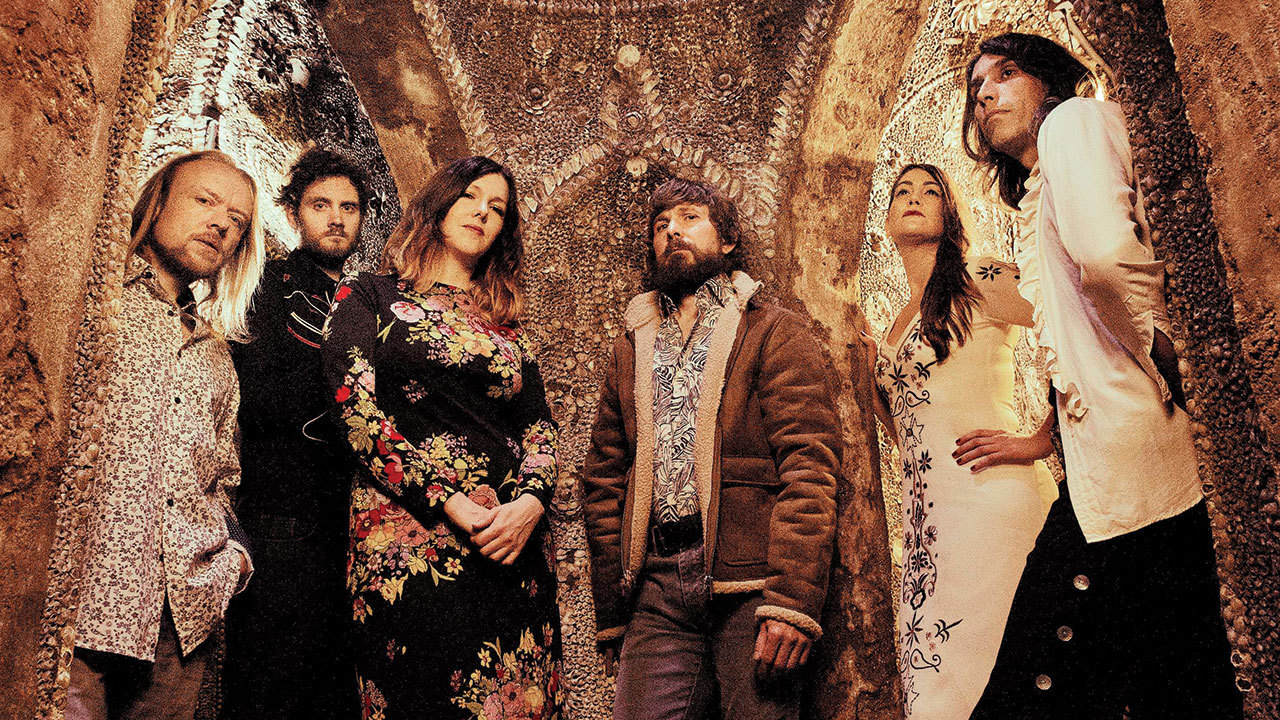Ever-rising British six-piece Galley Beggar are openly embracing the heavier end of the cosmic rock sound. The evolution is plain to hear on the band’s new and admirable fourth album Heathen Hymns. But weren’t this Kentish crew supposed to be a folk rock band?
It turns out there may have been some minor misfiling. A bit like a library book that was returned to the wrong section, Galley Beggar will still be found by those who knew them already, and will always tip the hat to such forebears as Fairport Convention and Trees, but now they’re also being discovered by a different set of enquiring minds.
Mat Fowler, guitarist and mandolin man of the line-up and husband of lead vocalist Maria O’Donnell, says that their confidence to open the window to a more robust sound was encouraged by their record company. To emphasise the point and show how they’re broadening their label’s horizons as well as their own, Heathen Hymns is their second album for Rise Above, the label founded in the late 1980s by Lee Dorrian, then the vocalist with Napalm Death.
“The label’s direction has allowed us to open up to that metal audience that we wouldn’t have even thought about approaching or targeting,” says Fowler. “And being a bit more cosmic, I suppose.”
The album abounds with examples of how the supposedly incongruous disciplines of hard rock and traditional folk can be friends. The eloquent guitar lines of Fowler and David Ellis weave around O’Donnell’s graceful vocals both on their own new songs and some time-steeped adaptations.
It is, says Fowler, an interpolation they were first inspired to attempt when they heard how Sandy Denny’s voice dovetailed so memorably in a rock band format, on the Led Zeppelin IV highlight of 1971, The Battle Of Evermore.
“This album, and performing it, made us realise we were kind of barking up the wrong tree in a way, with the folk scene that we’ve chased for so long. We [were] trying to appease one audience and it was probably never the right one for us in the first place.
“We don’t really see ourselves as a folk band, although we’re pigeonholed into that,” Fowler continues. “Obviously we take traditional songs and ideas and make music with them, but we listened to the Radio 2 Folk Awards recently and it was just a world apart from the stuff we do and have always wanted to do. Other bands that we love, that are doing similar things, don’t get a mention in that arena.”
But no existing Galley Beggar fan needs to worry that they’re on some sort of death metal collision course. New pieces like The Lake and Lorelei retain the aged mysticism that was always part of their appeal, from their 2009 origins and the debut album that followed a year later, Reformation House.
“This album is where we always wanted to get to,” he avows. “This is the first one where we’ve all thought, ‘Right, there’s not a weak one on there.’ We all really like it.
“But we’re very careful to keep the sound and style that we’ve built up, that we ourselves have become so accustomed to playing, and secondly what people have said they liked. We want to be consistent, without going too mental.” His and Maria’s seven month old baby gurgles down the phone in approval.
Heathen Hymns has two traditional pieces that the band have turned to their distinct advantage. The Girl I Left Behind Me meanders for a mesmerising eight minutes with canyon-deep guitar textures reminiscent of the hugely underrated, Danny Kirwan and Bob Welch-driven Fleetwood Mac era of the early 70s. The much-renewed Let No Man Steal Your Thyme, meanwhile, jangles and rumbles with understated power and a guest vocal by Trees’ Celia Drummond.
“It’s like with Geordie, from the last album,” says Fowler. “Again, Let No Man Steal Your Thyme is a very traditional track, everyone’s done it. We didn’t want to do just a straight cover. The melody is pretty consistent, from Pentangle to whoever else, but we just wanted to use the lyrical context and put our own music to it. The melody’s similar, but it’s trying to revitalise the song, I suppose.
“The other one, The Girl I Left Behind Me, is a very old soldiers’ marching tune from god knows how long ago. We heard it on Sharpe, Sean Bean’s TV series, it was in the soundtrack to one of the episodes. It’s just a twee, not very good tune, but we really liked the lyrical context, so we put some stuff down, and that’s what came out.”
For a band with day jobs, families and no pretensions, such is the natural way for Galley Beggar to be themselves, free of highfalutin, overarching concepts. “We don’t really think of an album idea from start to finish,” says the guitarist. “We have one song, then we do another one and another, and say, ‘It’s kind of an album’s worth, do they mesh together?’ If not, we’ll add some more and take some away. It’s nothing more intelligent than that.”
For all their responsibilities, the band have committed to play at least one gig per month this year to put more wood on the Heathen Hymns fire, and will do one in November, in their home town of Dartford, supporting Curved Air.
They enthuse about the influence of Fairport collectively and their ex-guitarists Richard Thompson and Jerry Donahue individually, but Galley Beggar’s sound now has a personalised profundity to it that will only deepen.
“It’s been incremental since we started,” says Fowler. “It’s been a long slog and we haven’t made any huge jumps. Going from where we are to the next level is the hardest, or the biggest, leap.
“Back in 2008-9,” he concludes, “We thought, ‘No one else is doing this at the moment, and this music’s great, so we might have found a gap in the market.’ It grew from there. That’s the long and the short of it, and we’re still loving it and exploring it.”
Heathen Hymns is out now on Rise Above. See www.galleybeggar.com for more information.

